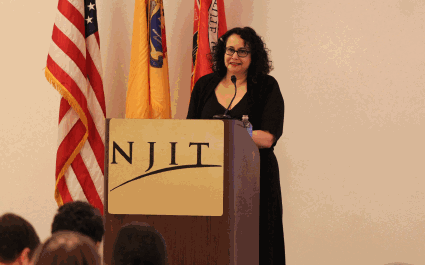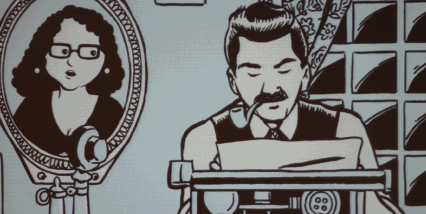Yvonne Chen
Managing Editor
Brooke Gladstone: [email protected]
Do you let bias hinder you from discovering the truth? How much of your media consumption do you consciously control?
These are but two of the thought-provoking questions raised by Brooke Gladstone, host of media analysis podcast On the Media and author of The Influencing Machine. Last Wednesday, she delivered a seminar at NJIT exploring the unseen influences that affect our media consumption.
Gladstone opened by introducing Victor Tausk, a psychologist who coined the term “the influencing machine.” This term describes an entity which his patients would blame for causing their aliments, thereby absolving themselves of responsibility to control their condition. We see media as influencing machines, says Gladstone, and often forget that we are also responsible, and capable, of controlling our understanding of news.
The first step to smart media consumption is to “know thyself,” said Gladstone. “What was once a trickle is now a flood” of news, highly filtered by consumers even more so than producers. She tells us to constantly question ourselves, because humans tend to alter their opinions to be consistent with prejudices and preexisting notions. This is a survival mechanism. We are “wired” to “hold on to old beliefs such that we let them trap ourselves.”
This is not to say that news professionals don’t have a responsibility to report accurately, but simply that we are fundamentally driven by impulse and bias far more than we know.
In the case of impulse, scientists in Leipzig found that they could predict participants’ choices up to 7 seconds before they were observed to make a choice. Our stomach actually has its own nervous system, so when you feel “butterflies” in your stomach, it’s a sign that your stomach has made a decision and has reacted without you even realizing.
Concerning bias, participants in one experiment listened to recordings containing static noise which could be removed with a button press. The study found that smokers were likely to clear static when they heard information saying that smoking was not linked to cancer, while the converse was true for non-smokers. Gladstone called this a “perfect metaphor for how we consume media.”
Paul Slovic’s quote “one death is a tragedy, one million is a statistic” illustrates a common fallacy that we as news consumers must be mindful of. Gladstone underscored this point with a personal anecdote. Each week, her news program receives an Amnesty International report on some horrible world tragedy. However, they all “sound the same”, week after week. As a human, one’s reaction is to air the news, but as the editor of a news program, one must weigh content based on variety and novelty.
Slovic’s quote arose from a study during which participants were given two scenarios: eight children needing $300,000 for medical treatment, or one child needing $300,000 for medical treatment. When asked which group they would support, participants overwhelmingly chose the single child over the eight. Similarly, when participants were shown three photographs, containing a starving girl on her own, a starving boy on his own, and then both children together, they actually felt less sympathy when viewing the pair as opposed to the individual photos. “This is a case where 1+1 is less than 1.”
Sometimes, our opinion of the media and the media’s opinion of us are similarly formed. The media uses the notion of “public” and “public opinion” to generalize what they should report, while we sometimes think of “the media” as a single entity, even though the media consists of many different types of news sources with their own strengths and weaknesses. “The New York Times is not Reddit,”said Gladstone.
Gladstone concluded with a reminder that as a consumer in a sea of information, we must be our own watchdogs. In the words of the philosopher Soren Kierkegaard,
“What an individual is capable of may be measured by how far his understanding is from his willing. What a person can understand he must also make himself will. Between understanding and willing lie the excuses and evasions.”
This colloquium was sponsored by the Albert Dorman Honors College, The Vector, the College of Liberal Arts and Sciences, and the Humanities Department.
(put this in a box somewhere and remember to take out these words first!)
Being a Savvy News Consumer
If a news outlet’s source is another news outlet, go directly to the source.
Don’t trust information from unnamed law enforcement officials within the first hours of an event. That’s when they too are still getting new information and figuring things out.
Triangulate: consult multiple news sources to see different takes and viewpoints on an issue.
Step outside your comfort zone. Seek out news sources who provide opinions that challenge your own.
Don’t blindly trust all media, but neither blindly distrust all media. Distrust sources that lie to you, then seek out more reliable sources.




























